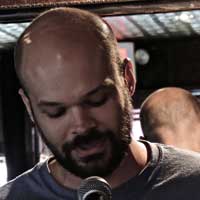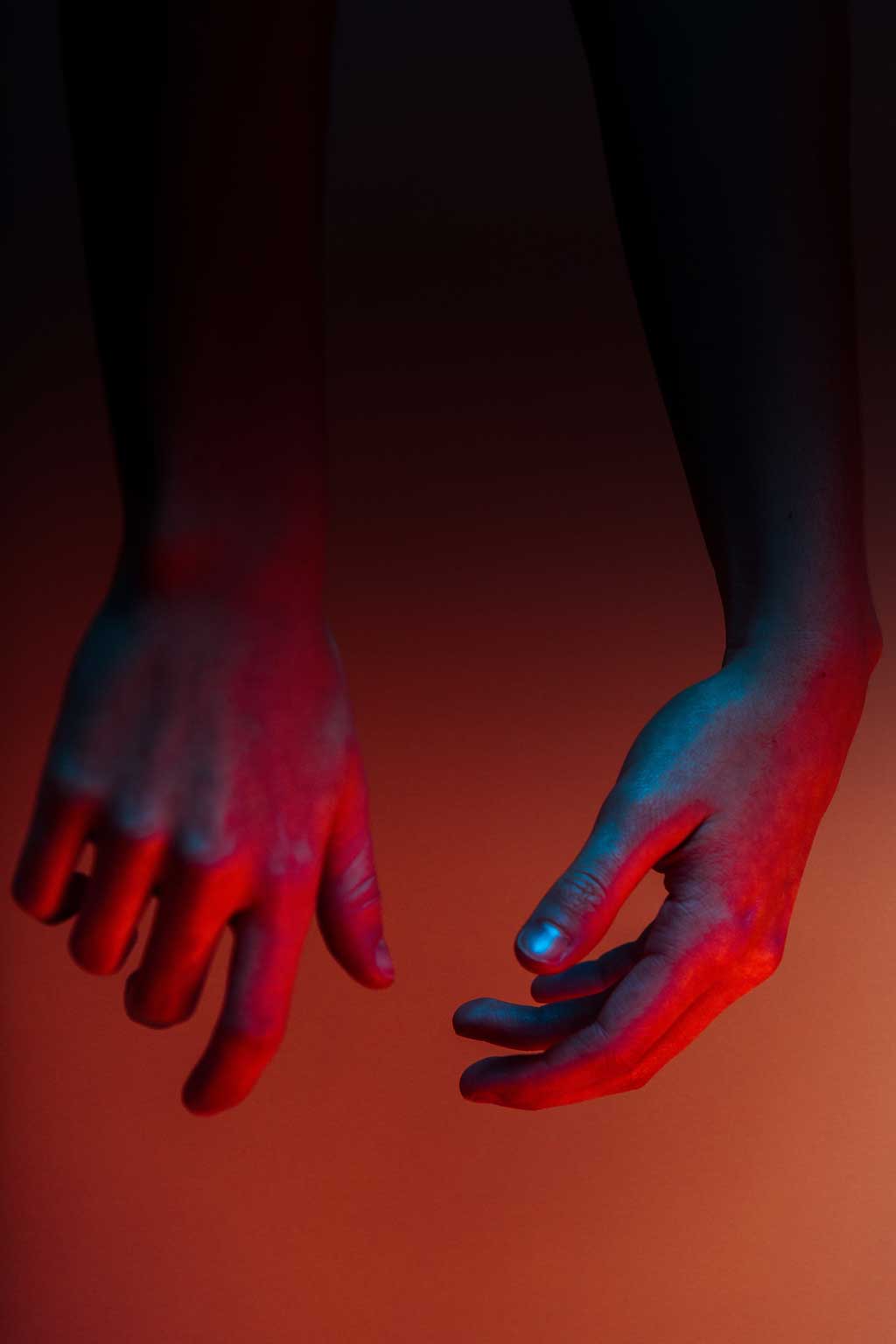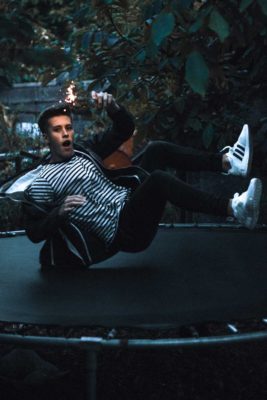Nick Kolakowski
SQUEEZE
The infection needs ten hours at most to take your life, the doctors tell you. Nothing will buy you more time: not pills, not potions, not prayers, not even amputation. The fungus forms a second body under your skin, shadowing your veins, wrapping around your bones. Its spongy mass smells like roses, if you slice a bit free of the host and hold it up to your nose.
…….
If you want to live, never hold any part of it to your nose. One stray spore in your lungs is all it needs to colonize your meat. In our homes, we keep the windows shut at all times, even in the moist-blanket heat of deep June. When we step outside, most of us wear surgical masks and goggles. How did Ron and I ever think we could bring a child into a world that’s rotting like this?
…….
We didn’t think about it. We just loved, and that was gone too soon. Two hours after we said, “I do” in our living room and exchanged our plastic panda-bear rings, someone rang the bell at the top of the hill. Ron left our reception with a couple guys from his guard shift. “There’s just one down in the culvert,” he said, picking up a plastic can of gasoline and his favorite machete as he headed out the door. “You’ll see the fire when we’re done.”
…….
Swamp Things, Ron always called them. My mom, when she was still alive, preferred the term Flower Heads, because she thought it sounded funny. Sometimes all you can do when confronted with grinding horror is laugh. I refuse to give anything related to this fungus the dignity of a name, even if it has the power to kill everyone I love, or transform them into something awful.
…….
The patrol in the culvert went wrong, because more than one of those things had found their way up from the basin, drawn as always by our lights. They crept from the humming night and wrapped their hands around Ron’s friend Billy and tore him apart like overcooked chicken. We burned what was left of him the next day. Before Ron could retreat up the incline with the rest of the crew, one of the creatures swiped his forearm, leaving three shallow scratches from elbow to wrist. Barely broke the skin, but it was enough.
…….
At first, everyone smiled and said everything would be okay. And every time they did, I bit my lip to stop myself from screaming in their faces. Nothing is okay. Not anymore.
II.
When the infection first swept the city, a military platoon turned our sleepy neighborhood into a fortress, boxed by high fences topped with barbed wire. When the troops pulled out, following new orders, they left behind enough weapons and supplies to keep us self-sufficient while the power died and the surrounding hills burned. We learned how to use the rifles, and took turns at the gate that bisected our main avenue. We set up a field hospital in a ranch house beside the fence, after clearing out the furniture and draping every inch of the rooms in plastic.
…….
Following the bloodshed in the culvert, the other guards took Ron to the hospital and burned his clothes and strapped him naked to a bed in one of the rooms. (Two years into this mess, we all know what to do when anyone’s wounded.) He was already feverish, his body slippery with sweat. When I arrived, the nurses on shift refused to let me through the plastic sheeting that covered the doorway. So I struck a bargain with Jill, the nurse in charge: three gallons of fresh water—a small fortune that hot summer—in exchange for two hours in her Hazmat suit.
…….
“Take it from someone who’s lost someone,” she said as I suited up. “Getting closer won’t make it any better for you.”
…….
“We’ve all lost someone,” I told her, my voice muffled through the filter-mask, and unzipped the plastic that kept me from my husband. The hospital bed stood against the far wall; the only other furniture was a folding chair for visitors, a propane lantern for light, and a five-gallon plastic bucket for vomit. On a tray beneath the bed sat a long blade in a scuffed plastic scabbard, in case things went bad, because a gun might send a bullet through the plastic or a wall.
…….
I took a seat and reached for Ron’s hand. My heart thundering with panic. My throat tight.
…….
“Don’t touch him,” Jill called out, as she zipped the room back up. “He’s highly infectious, he’s about to start bleeding everywhere. We might have to burn that suit, and it’s not your suit, it’s mine.”
…….
“Got it,” I said, letting my hands dangle between my thighs. The suit was too big for my body, loose as a tent around my thighs and belly, and cooling sweat pooled at my waistband. The filter, cobbled together from cardboard and melted plastic and other spare bits, made my rushing breath taste like a charcoal grill.
…….
“Sweetie?” I asked Ron.
…….
“I hear you,” he said, and swallowed hard. His face pale, eyes wide and black, his cheeks shiny. I kept remembering the first week after the electrical grid failed, when we spent nights in our enormous claw-foot bathtub because it was the coldest place in the house, keeping the fear at bay by dredging up our grade-school jokes about farts and diarrhea and death. I remembered the way we held hands as we walked the neighborhood’s empty streets in daylight, squeezing in code. I love you. I’m here for you. We’ll get through this together.
…….
“Good, because this thing makes me sound like Darth Vader,” I said, before deepening my voice into the world’s least-convincing James Earl Jones impersonation: “Luke, I am your father.”
…….
“That was horrible,” he said, grinning now. His front teeth flecked with blood.
…….
“Oh, I know. But at least it made you smile.”
…….
“It did,” he said, and his eyes closed.
III.
A few days after the electrical grid collapsed for good, we saw the first Flower Heads. They came only at night, slinking on the roads toward the brightest lights. Beneath their mossy veils, sprinkled with bright petals, we sometimes recognized the eye or lip or tattoo of a lost relative. They weren’t zombies, at least not in the George Romero sense. When they bit us, we realized they still felt hunger. When we shot or cut them down, and they bled over the pavement, we realized their hearts still beat.
…….
“This fungus, or whatever it is, I bet it gets in their brains,” Ron said, after we killed a herd of them at the gate. “Plays them like a joystick. I remember watching this nature show a couple years back, it said some insect parasites can do that, control the host neurologically.”
…….
“But most of the people who get infected by this stuff,” I said, “they die. Why do some of them keep moving around?”
…….
He shrugged. “I don’t know, genetics? Who knows anything anymore?”
…….
“Any more beer in the cooler? I could use about three.”
…….
Around that time we had started drinking heavily, breaking into empty houses and grabbing every bottle we could find. Can you blame us? Sometimes we would fall asleep so drunk Ron pissed the bed, and neither of us noticed until the next morning. We spiked our orange juice with vodka at breakfast and filled our water bottles with bourbon before we headed out on patrol.
…….
After too many nasty hangovers we decided to quit, but with sobriety came insomnia, and as I lay in bed at night, my traitorous brain kept imagining its own hijacking. Did it hurt, as the fungus wormed its way inside the house of your skull, or did you just get delirious and sort of fade away? And after the takeover, did a part of you continue to exist, deep within some buzzing void? Could that part of you still see out your eyes, as you shuffled and moaned?
…….
Curled against Ron’s sleeping back, I wondered again and again if I could drive a blade through his infected head. Or would I hesitate, as so many people did? Could I keep living after taking steel to flesh I loved, stopping it for good?
IV.
When I turned to the doorway again, Jill stood on the other side of the plastic, making a show of staring at her watch. I rose from the chair, shaking the numbness from my legs, and walked over. “I need a new suit, one I can touch him in, because I’m going to treat him,” I said, struggling to keep my voice level. “And also painkillers, bandages, bottled water, whatever you have.”
…….
“There’s nothing we can do. You know what’s happening here.” Jill spoke so loudly I worried Ron would hear. “You need to stop thinking about this like a fixable situation.”
…….
“Just get me a suit and supplies,” I said. “I know you got crates of that stuff.”
…….
“I’m not handing anything over for a helpless case. Not when I have to treat all sorts of injuries, curable illness.”
…….
“But the rest of this hospital is empty.”
…….
The demon part of me wanted to tear through the partition and grip her by the throat. “Let’s make a deal. What do you want?”
…….
It was impossible to read her expression through the shimmering barrier. “You live in that white house on Marigold? The one with the blue shutters?”
…….
“Uh, yeah?”
…….
“It’s a big house,” she said. “It’d be nice to move away from the fence a bit.”
…….
“You’re not moving in. Not for any length of time.”
…….
“Well, it didn’t hurt to ask. You got sugar, coffee, preserves, anything sweet?”
…….
“Yeah, canned preserves in our pantry, made them myself.”
…….
“And let me guess: your pantry’s locked, right?”
…….
Who didn’t keep their supplies secure, or hidden? “The lock’s a keypad. Code is one-oh-five-five,” I said. Doesn’t really matter, I told myself. It’s not like I had much left in there, anyway.
…….
Jill nodded and disappeared from the doorway. Beneath the rustle of plastic and the hiss of Ron’s breathing I could hear her speaking to the other nurse in hushed tones, probably explaining why she had to leave for a bit.
…….
While I waited, I turned to check on Ron. His eyes closed, arms and legs trembling slightly. I wondered if the red petals would burst from his skin before he died. Do I have what it takes to kill you, baby? Do I kill myself afterwards?
…….
Jill reappeared, snapping off her gloves as she angled for the decontamination shower bolted to the ceiling of the foyer. “I promise I won’t take more than my fair share,” she called out as white liquid gushed from the showerhead, soaking her suit on its way to the drain-hole cut in the floor. “And don’t leave that room. The supply closet is locked, and Sarah won’t let you in until I’m back.”
…….
Her sterilizing complete, Jill stripped off her protective gear, changed into a pair of cargo pants and a long-sleeved shirt, snapped on a respirator and swimming goggles, and left. I took a seat again, wondering if she would keep her word about not taking too much of our stuff. Maybe it was an illusion, but I swear I could feel the heat of Ron’s fever baking through the thin plastic of my suit.
V.
Over the next eight hours my husband alternated between sweaty dozing and calling my name over and over again. His fingers and toes turned white and waxy, the skin cracking. The paleness crept up his forearms and shins like a creeping ice floe, the hair falling out along its path. At one point his back arched, rising high off the bed, and I saw the topsheet coated with hair and bits of skin. The cracks followed the paleness into the deep meat of his arms and legs and he began to bleed, little spots that quickly became black rivulets in the flickering light from the lamp on the floor.
…….
I would have given anything to heal him, but all I could do was daub at the bloody cracks with my rolled-up cloth. When the cotton soaked through I tossed it in the nearby bucket and fetched a fresh one. I thought about us walking along hot roads, our sweaty fingers entwined. Squeezing messages. I love you. I need you.
…….
By the ninth hour, Ron began to cough up his insides. His lips bloody. His face had the telltale patches now, faint webs on his cheeks and neck that gleamed against the paleness before shading into pink. I waited for them to deepen into red. At that point, my husband would start sprouting flora like a damn terrarium. He would have laughed at that comparison.
…….
Whether or not I had to put him down, I knew what would happen after he died. Our burial brigade always moved with the grace of a well-rehearsed chorus line: four men in Hazmat suits stripping the corpse, wrapping it in a large plastic bag like a piece of dry cleaning, stuffing it into a scorched metal box. The brigade carried every boxed body to the ash-pit beside the highway off-ramp, where they set it to burn atop a pyre of gasoline-soaked wood. It took six or seven hours to reduce an infected body to sterile ash.
…….
I had no idea if Ron wanted us to burn him in his two-piece black suit, or one of his favorite t-shirts. We had never talked about funeral plans. Maybe we thought it would jinx our chances at living. What did it matter what we dressed him in, anyway? I would never get to touch him again, and that was the worst part. The thought of forgetting the smell of his skin made my stomach cramp, hard and fast, as if someone had punched me.
…….
As I bent over, sucking air through my miserable filter, I noted that my new Hazmat suit was spattered with blood from Ron’s dying. For the first time I hoped Jill had taken whatever she wanted from our home, because I had wrecked this precious outfit. Sorry, Jill.
…….
Ron stopped coughing. His breathing hitched. I sat up and willed my quaking knees to hold steady. I kept my eyes locked on his face, telling myself that it was my duty to bear witness. That after he passed, I would become the sole keeper of our shared memories, all the quiet moments that formed us.
…….
I leaned close to his leaking ear and said: “I’ll keep the ring on.”
…….
“You’d better,” he whispered back. Or maybe I imagined it. The eldritch light had cast his mouth in deep shadow.
…….
I glanced toward the doorway, which framed darkness. I hoped the nurses on the other side had dozed off.
…….
As quietly as I could, I peeled away the tape that covered the seam between my right glove and the sleeve.
…….
All that matters in this life is what we give each other. That I felt your presence in the dark, and that you felt mine in return.
…….
Pulling off my right glove, I reached over and took my husband’s cold, slick hand. “I love you,” I said, and squeezed.
…….
Ron squeezed back.
 Nick Kolakowski is the author of the thriller novels Maxine Unleashes Doomsday and Boise Longpig Hunting Club (both from Down & Out Books). His poetry and fiction have appeared in Cleaver Magazine, North American Review, McSweeney’s, Shotgun Honey, 7×7.la, Carrier Pigeon, and other venues. He lives and works in New York City.
Nick Kolakowski is the author of the thriller novels Maxine Unleashes Doomsday and Boise Longpig Hunting Club (both from Down & Out Books). His poetry and fiction have appeared in Cleaver Magazine, North American Review, McSweeney’s, Shotgun Honey, 7×7.la, Carrier Pigeon, and other venues. He lives and works in New York City.
Image credit: ian dooley on Unsplash
Read more from Cleaver Magazine’s Issue #29.




